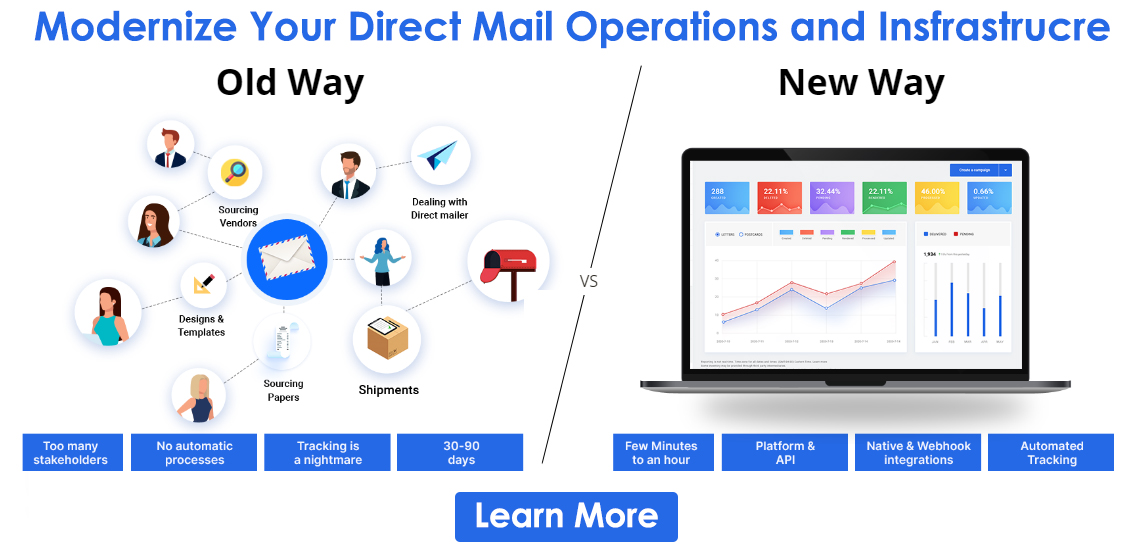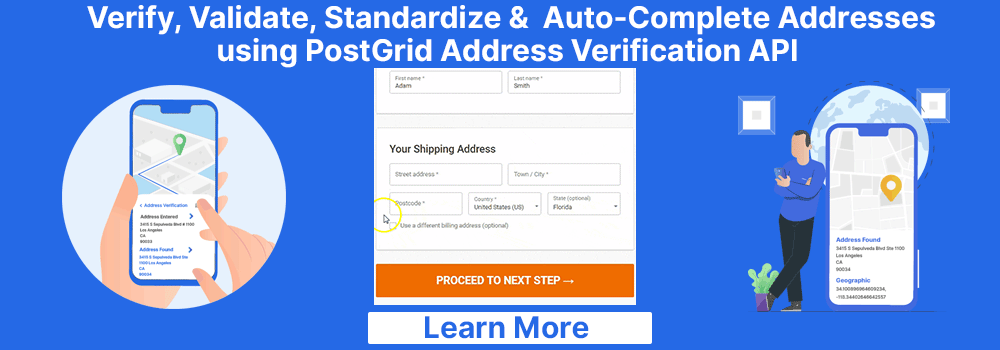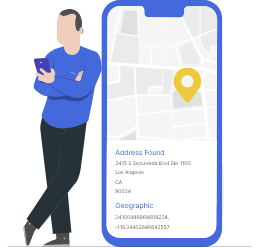
Address Verification Service: How to Use It for Effective Direct Mailings
A direct mail campaign relies on an accurate mailing list. Marketers understand this and ensure precise addresses in their databases.
A campaign with poor addresses will result in the wastage of marketing resources. They can expect a reasonable response rate when their mail pieces go to the correct destinations. That’s where Address Verification Service Canada comes in.

It plays a vital role in direct mail marketing campaigns. Marketers can improve their delivery rate and save money on postage. They can ensure the accuracy of their mailing list and avoid unnecessary waste.
This blog will explore everything about address verification services. We will explore how address verification APIs can enhance direct mail marketing campaigns.
Understanding Address Verification Service(AVS)
What is AVS?
Address Verification Service (AVS) is a service provided by processors to let businesses authenticate and verify payment methods like credit/debit cards or addresses used by a customer.
AVS happens when the merchant requests authorization for an online credit/debit card transaction. The credit card company or issuing bank checks the billing address provided by the customer from the billing addresses in its records.
The reports then go back to the merchant, whose responsibility is to determine whether to proceed with the transaction. AVS is helpful with other security features of a credit/debit card, such as the CVV number.
Please note that address verification is not available by all credit card providers. It is also only available in some countries. Generally, AVS is not available for foreign credit cards.
It typically verifies only the numeric portions of a cardholder’s billing address. AVS does not guarantee the deliverability of a delivery address.
Third-party service providers also avail address verification services for various applications. For example, marketers use AVS for their direct mail marketing campaigns.
It saves time and money by reducing undeliverable mail. Marketers can also ensure compliance with the postal regulations of the country.
Address verification services AVS also help in segmenting and personalizing mail. Companies can learn additional data points about the recipients. They can understand their age, gender, and income.
Many companies boost their ROI by sending marketing mail only to relevant prospects. A clean database helps in executing successful direct mail advertising campaigns.
Address Verification Service (AVS) Support
AVS is a service used to combat fraudulent activity for online transactions by cross-verifying the address provided by a cardholder to the merchant.
This verification uses the card issuer’s records. A few companies offering AVS are MasterCard, Visa, Discover, and American Express in the United States, the United Kingdom, and Canada.
Cardholders of a bank that does not support AVS are most likely to receive an error during a transaction due to the lack of verification.
Apart from the automated verification, some banks might provide merchants with a manual verification system. It is generally done for foreign credit card accounts, as the AVS works only in the same country.
This facility helps the merchants prevent fraudulent activities arising from other countries. For this verification, the merchant’s bank calls or faxes to the customer’s bank.
Rejections due to Address Verification System
“Declined due to AVS mismatch” is a standard authorization code. It means the authorization code, along with the authorized funds, will remain on the customer’s cards until the issuing bank gets it expired.
This time is typically seven days for most business types except hotels and car rentals, which might take up to 30 days. Hence, the bank subtracts the amount from the customer’s available balance, which appears on their bank statement. The customer might mistake it for an actual charge.
Most card-issuing banks remove authorization within seven days if the customer didn’t claim for settlement.
Special Considerations for Address Verification System (AVS)
Address Verification System in Canada or anywhere globally does not guarantee fraud prevention. On rare occasions, the system might generate false or partial declines.
A partial decline might require the merchant to use additional validation methods before the completion of the transaction.
We recommend that a payment gateway or processor use other fraud-detecting mechanisms.
Various other verification methods include
- CVV validation
- IP address verification
- 3D security
- Biometric analysis
- Device authentication
Why is the Address Verification System (AVS) important?
The Address Verification System (AVS) helps ‘mail to order/phone to order’ (MOTO) merchants with transactions. It has become a key feature for all card-not-present fraud detection systems. It also helps you clean and validate your mailing list by verifying the details with the official database. Using correct databases and fraud detection, businesses can decrease the expenses and missed opportunities to get a more accurate analytical report.
Address Verification Service for Direct Mail Marketing Campaigns
Companies invest a lot of time in planning and launching a successful direct mail marketing campaign. Many businesses send direct mail pieces regularly to their customers, putting considerable time, money, and resources into creating and shipping the Direct Mail.
Most people miss the part where a significant percentage of mailpieces sent aren’t reaching the intended recipient because of wrong addresses and un-updated databases. Address Verification service helps businesses save time, money, and resources and save them the extra effort.
Address Verification for Customers
Address verification service in Canada or other supported countries promises an additional line of defence for customers. This defence is reliable in avoiding low-effort attacks to misuse your credit cards and personal information like addresses.
 Also Read: Lietuvos Paštas Address Validation
Also Read: Lietuvos Paštas Address ValidationAddress verification for Merchants
The AVS response signal benefits merchants, and you must weigh them into your risk scoring. Due to this, you remain protected from chargeback requests, which are way too costly for merchants to bear.
Not to mention, it drives customers away due to the frustration it comes with. Merchants tend to pay up to 3.6 times the money lost in transactions, harming your chargeback rates with the banks.
In addition to the outcome of the Address Verification Service, merchants can use the billing address to match the customer’s IP address. It tells you how far the customer seems to be from the country and the address where it was registered.
It is always best to reach your customers via email or phone to cross-verify their addresses/cards, as AVS is also prone to false declines and errors.
How does Address Verification Service (AVS) work?
Address Verification for Merchant Payments
Issuing banks and platforms offer AVS to businesses as a tool to cut down on fraudulent activities. Address verification comes into action during the card authentication process of a customer.
The customer receives a billing address as soon as the customer submits a card for payment. On accepting the payment information, the payment processor contacts the bank to authorize the purchase.
Address Verification Service for Direct Mail
There are postal services across the world where substantial address databases are stored. These postal services are known to keep data fresh and relevant.
When using address verification service (AVS) for direct mail, third-party service providers, like Postgrid, help you access and verify the addresses with the official postal database.
It is essential to be a certified third-party vendor to access the vast database. This way, addresses are verified directly and easily with the help of the national postal services and third-party service providers.
 Also Read: Deutsche Post Address Validation
Also Read: Deutsche Post Address Validation Standard AVS response codes and their explanation
What is ‘AVS rejected’?
‘AVS rejected’ is a message that might show up for businesses while attempting to process a customer’s card payment. It can also show up for the cardholder when trying to purchase online.
This message means that the card issuer declined to authorize the card transaction. It usually happens when the address provided does not match the address in the database.
What does AVS mismatch mean?
A mismatch occurs in AVS when the address information presented at checkout during a debit/credit card transaction does not match the address the issuer has on their database. In case of this mismatch, the transaction gets declined.
AVS mismatch is a term used to describe what happens during an authorization that makes the issuer reject the transaction.
What is AVS not supported?
AVS not supported means the card issuing bank does not support Address verification, so they cannot complete the transaction.
How does the Address Verification Service in Canada work?
Suppose you are a business looking for a successful direct mail marketing campaign in Canada. In that case, you need an authentic and reliable AVS that efficiently helps you with your present database.
Here are a few critical steps to an impactful, result-generating Address Verification Service in Canada:
Canada Post Address Autocomplete
Address Autocomplete enables you to enter your address using a few keystrokes. It auto-fills the address for you, making it easier and faster to fill in the details.
For example, when you start typing 9187 Bay, the tool can automatically fill in the remaining address details, like- 9187 Bay St, Toronto, NT X8Z 2G8.
An Address Verification Service (AVS) tool in Canada uses geocoding to find a list of accurate suggestions for the user. The user can then select the address from the list provided.
It leaves almost little to no room for error and saves a lot of time.
Address Parsing and Standardisation
Address Parsing means the process of disassembling an address into smaller parts. It separates and tags components like street address, city, province, etc.
The next step is standardization, where you can format addresses with the Canada Post addressing guidelines.
These two steps together break down your mailing address and format them again. It ensures that Canada Post can send your Direct Mail accurately to the target audience.
Address Verification
The Address Verification Service in Canada syncs with the Canadian Postal Service. An address verification service API double-checks a mailing address to ensure its existence and authenticity. If the address exists, it is marked valid and ready for delivery.
Otherwise, the API troubleshootes and resolves the issue (if any). Sometimes, addresses are fake and imaginary, so they don’t pass the verification.
It helps businesses save resources, time, and money by refraining from sending mailers to such addresses and avoiding unnecessary returns.
 Also Read: Address Verification Process
Also Read: Address Verification ProcessHow do you start using the Address Verification service in Canada?
You already know how much loss the lack of a proper address verification service API can do to your business. Without the AVS, you may hurt your chances of better sales and retaining your current clients.
You also lose the time, money, and resources you put in. Manual validation of addresses is tiresome, time-consuming, and likely to cause errors affecting your brand’s reputation.
Hence, in a vastly populated country like Canada, it becomes necessary to keep a check on your mailing list by regularly cleaning and updating your inventory.
You can solve all these problems simultaneously with a single solution, i.e., Postgrid’s Address Verification Service API.
At Postgrid, we use an API that helps with your direct mail campaign in a single platform and generates better results using less time, money, and resources. Our Address Verification Service API integrates with your system to check and rectify all the address data.
It helps you instantly verify any address that you have provided. It also gives you a lot of metadata, such as RDI, ZIP+4, Latitude/longitude, geo-coordinates, etc.
The Postgrid Address Verification Service API is certified by CASS (USPS) and SERP (Canada Post). It ensures all addresses are authentically cleansed and verified, and the verification happens under Canadian postal standards.
How does the PostgGrid Address Verification Service API work?
Our easy-to-use Address Validate API integrates in the following way:
Create an account: Create an account with Postgrid and enter the required information.
Once done, your account will be ready in just a few minutes. Our setup is quick, easy, and self-explanatory.
- Login: Login into your account with a unique user ID and password. An easy-to-use dashboard is accessible, containing the information you need to use the API effectively.
- Access API Keys: Test and live API keys are available through the settings menu. You will be required to copy the keys from here to use them. Using these keys under maximum security only on trusted servers would be best.
- Paste the API Keys: The next step is to paste the URL of our Address Verification Service API to your website’s address form, where you want to verify the address.
- Start API calls: After pasting your URL on the website, you will receive successful API calls when requested. You can also customize it to your needs. Feel free to contact us if the API responds how you need it or if you get stuck at any stage. We will help you with the API instantly.
 Also Read: International Address Verification API
Also Read: International Address Verification APIConclusion
Using your database from your local postal service can take time and effort. It takes considerable investment and enormous effort. However, you can easily download Canada’s address database with Postgrid’s Address Verification Service API.
Canada’s local postal service might have millions of addresses in its database. Still, with third-party postal services and data providers, we have more.
It gives you more reach with more possible addresses. However, we run our primary address verification process with the official database.
Our efficient and easy-to-use API gives your business the best Direct Mail campaign partner. Our API features, like easy integration, detailed analysis, bulk verification, international address verification, 24-hour support, etc., make us among the best Address Verification Services in Canada.
With us, you will remain less stressed, and help you significantly impact your customers.
Sign up now to access our address verification API
Contact us now!










